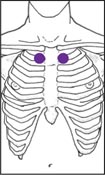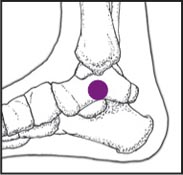Vitamin D: The Sunlight Vitamin
Winter is dark. You go to work in the dark and come home
in the dark. On December 21, the shortest day of the year,
people in Miami can expect about 10 ½ hours daytime while
people in Seattle will only have about 8 ½ hours.
in the dark. On December 21, the shortest day of the year,
people in Miami can expect about 10 ½ hours daytime while
people in Seattle will only have about 8 ½ hours.
Short days mean more than just coping with dark commutes. Without enough sunlight, your body can’t produce Vitamin D.
Your body needs sunlight to produce Vitamin D. Vitamin D is important for absorption of calcium and regulating the immune system. It keeps your brain healthy, helps you maintain your weight and helps reduce your risk of cancer and heart attacks.
Low levels of Vitamin D are linked with many health risks. Vitamin D deficiency can cause Rickets, a condition of soft, weak bones, but it also plays a role in heart disease, diabetes and cancer. Studies have even linked it with an increased likelihood of catching a cold.
Scientists disagree about the extent of the problem. Different studies estimate from 10 – 75% of US teens and adults to have a Vitamin D deficiency. But everyone agrees that Vitamin D levels are dropping.
Certain groups have a higher incidence of Vitamin D deficiency. Blacks and Hispanics have the lowest levels of Vitamin D. People with no college education, obesity, poor health, hypertension, low HDL cholesterol or who don’t consume milk daily also show deficiencies.
But everyone should be concerned. Because more and more people use sunscreens, stay indoors, or wear long sleeves, scientists and doctors worry that Vitamin D deficiency will continue to grow.
How to Increase your Vitamin D
Sunlight is the best way to increase your Vitamin D however it’s a tricky balance. Using just a SPF 15 sunscreen cuts the skin’s Vitamin D production by 99 percent. But of course, soaking in the sun without sunscreen may increase your risk of skin cancer.
There are several dietary sources for Vitamin D. Fatty fishes like salmon, tuna, and mackerel contain healthy amounts. Some fortified foods like milk, orange juice or cereal contain high Vitamin D levels. Cod liver oil is also high.
Supplements are another option. Vitamin D3 is the best supplement form to take for those who have deficiencies. Vitamin D requires other fat-soluble vitamins such as Vitamin A and K and certain trace minerals in order to be properly utilized by the body. Use a holistic view when you choose your supplement. Consult with your acupuncturist if you are unsure which is best for you.
Wash Up
Your Grandmother was right—wash your hands! Wash them before meals, after meals, and periodically through the day. It’s not just old-fashioned hygiene; it’s good medical sense.
Washing your hands is one of the best ways to prevent a cold. Doctors tell us that adults average 2 – 4 colds/year and children average 6 – 8 colds/year. Washing your hands reduces the bacteria and viruses on your hands, decreasing your exposure to the germs that cause colds. Even the FDA recommends that the best defense against colds is plain old hand washing.
When you wash your hands, lather up and wash your entire hand—front and back. Lather for a full 20 seconds, a very long time if you’re not used to it. Try singing the Happy Birthday song twice to estimate the time.
Research shows that there is no increased benefit from using anti-bacterial soap. Use common hand soap but be sure to scrub the whole time. Most of the benefit of hand washing is simply rinsing the germs off your hands.
If you can’t wash your hands with soap and water, then hand sanitizer is the next best thing. Not all hand sanitizers are equal. Look for alcohol based sanitizers and avoid anything with triclosan. For added natural benefits, look for hand sanitizers with essential oils.

 Kidney 27 (KD 27)
Kidney 27 (KD 27) Kidney 6 (KD6)
Kidney 6 (KD6)